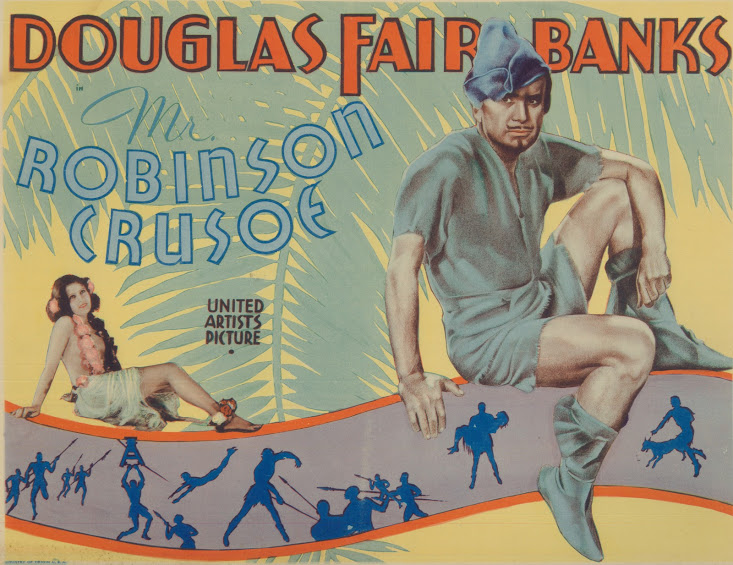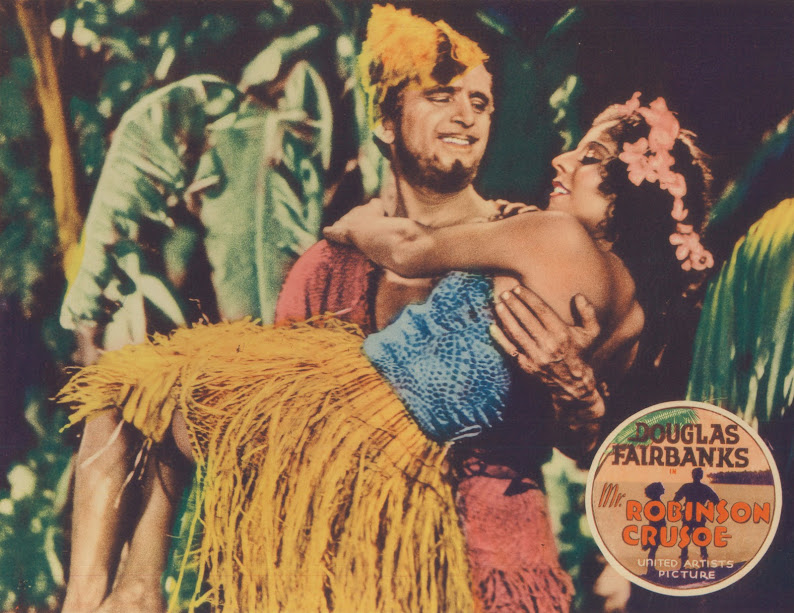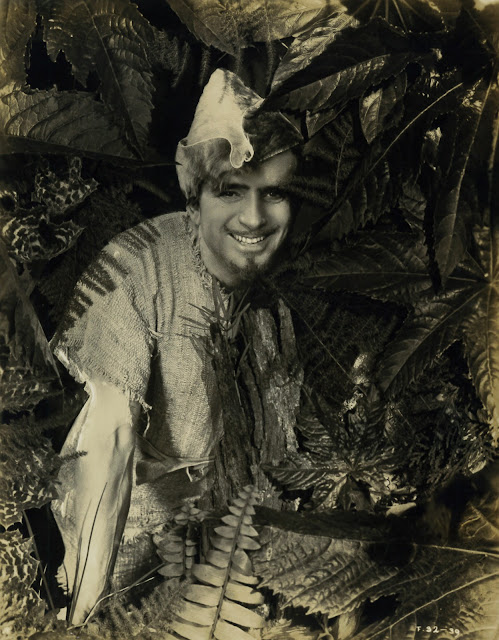
Doug's South Seas Adventure
8mm is where I go for serious living in the past. There's such delicacy to little Blackhawk boxes and films that came in them. They bespeak a time when people who remembered the silent era took pains to collect artifacts from it. There's not many left above-ground to tell us what fun Douglas Fairbanks was in theatres. We have to take written word of gone-to-reward fans like Alistair Cooke, who penned a thinking man's tribute for The Museum Of Modern Art soon after Doug's passing (1939) and remained a vocal champion from there on. Blackhawk was operated by grown-ups who looked back on Fairbanks with a child's fondness. They kept his best features available on 8 and 16mm. The company listed a condensation of Mr. Robinson Crusoe, Doug's late-career talker from 1932 that was his penultimate offering. I watched those nine minutes lovingly edited and narrated by Paul Killiam, a longtime evangelist for early cinema. He spreads gospel for this athletic star whose enormous popularity we'll never fully grasp for not having been there in his prime. Mr. Robinson Crusoe was something Fairbanks knocked off between golf games and tiger hunts. His dedication to filmmaking drooped once sound came in and took joy out of stardom. I wonder if Doug didn't do Crusoe mostly to satisfy product quota for part-owned United Artists. Blackhawk's souvenir made me want to see the whole of Mr. Robinson Crusoe, so deeper I plumbed into laser disc depths for an Image release that probably sold no more than a hundred copies. What with Fairbanks silents offered on DVD or Blu, why not his four talkies? Taming Of The Shrew, Reaching For The Moon, Around The World In 80 Minutes, and Mr. Robinson Crusoe would make a compelling set. UPDATE 4/8/2022: We are twelve years later and that Fairbanks talkie set has not happened yet, me not optimistic it ever will. There is however Mr. Robinson Crusoe all over You Tube, being PD, plus streaming at every place one could imagine. I found instance at YT courtesy The Film Detective that looked OK, as in passable, but wouldn't it be nice if the Museum of Modern Art loosed its original elements, donated during the thirties by Fairbanks himself. Crusoe's standing could use such a hypo, for based on quality as it stands, there is little chance the film's reputation will enhance except among fans (how many left?) who applaud Doug in whatever context or circumstance.



To call Crusoe's a narrative by customary definition would be inapt. Home movie is more like it. We open on prosperous Doug aboard a yacht boasting to sportsman friends of how he could survive ... no, thrive ... on an uninhabited island they pass. Lickety-split they exchange bets and off he leaps into the surf. Join Crusoe two minutes late and you'd miss its whole set-up. No other personality could have gotten away with so little exposition. The fact this is Fairbanks makes it only natural he would engage such a challenge. American pluck is understood to clinch success of his island venture, bringing modern ideas wrested out of wilderness. Doug handily constructs a working radio from scraps he finds on the beach, believable if not to us then easily to 1932 watchers many of whom had built their own receivers rather than bearing expense of ones store-bought. Does Fairbanks being forty-nine at the time lessen credibility? Not for the shape he's in here and tricks he performs.
A melancholic undercurrent beneath the bravado make Doug's adventures resonate with me. It was often present to some degree or other. Do I sense clouds more for having read about his sometimes depressed mood? Darkness fell unmistakably over much of 1927's The Gaucho and parts of two year's later The Iron Mask, both late travelers down silent avenues that Fairbanks sadly realized were dead ends. After these, he took to wandering continents both alone or in company of restless chums (but seldom with left-at-home Mary). Doug had sense to know his ways were finished in Hollywood, and so steered wide of it. Mr. Robinson Crusoe was really just Fairbanks letting us observe what he'd do if left to primitive devices in paradise. Why bother with plot beyond a simplest of concepts? This and preceding Around The World In 80 Minutes were snapshots brought back from Doug's vacationing, and if you wanted to call him cynical in fobbing them off for paid admissions ... well then keep your nickels, because Fairbanks had all of those he'd ever need. Not to imply that Mr. Robinson Crusoe is in any way morose, for Fairbanks is cheerful to a fault throughout. All hardship is readily surmounted, Doug talking to himself for much of an opener act and crediting his ease of survival to the fact he had been a Boy Scout, and further, read a book once on skill as practiced in the wilds. Mr. Robinson Crusoe seems in ways a Fairbanks riposte to Tabu and others that took bleaker view to what Doug regards as paradise pure/simple. I wonder if he ever considered retiring to such a setting as depicted here. Surely it would have suited him better than what Hollywood had become.
Mr. Robinson Crusoe sort of cheats as to content and execution, being very much a barely working holiday for Fairbanks and crew. He took along those he thought congenial, many if not most serving as court jesters if not meaningful collaborators. More than one writer of then-prominence looked back upon trips with Doug as bizarre rambling where work kept a back seat to distractions where they could be found. Fairbanks by this stage needed distraction. Could be he needed a therapist more, though to his credit did not self-medicate and go down drunk and dissolute. If age was now obvious, Doug cut a dapper figure through travels, a public ready always to hear from his ports of call, if not movies he made.
Mr. Robinson Crusoe has movement and energy thanks to stunt ready Doug, who leaves modern sensibilities as to race and gender distinctly up a tree. DF makes a near slave of a captured man Friday and brings native squeeze Maria Alba (a Fairbanks side-dish during location shooting) home to entertain on Broadway a la Kong (did Cooper and Shoedsack get ideas here?). There is also Doug pals animal hunting elsewhere as the star pursues his island conquest. They shoot down a striped tiger as pretty as utter insensitivity might please, modern gasps insured should Mr. Robinson Crusoe rear its head again in revival (chance of that? Pretty near zero). Third worlds for Fairbanks was terrain to be tamed, and he was the guy to do it, in fact did at whatever native spots he descended upon. Ever hear about his and Mary's Euro and elsewhere tour? They honestly feared being consumed by crowds, nothing left but a hat and scraps of clothing. Novelty of fame was long spent for Fairbanks by the early-thirties, his trips as much escape as recreation. Had there been flights booked to other planets in his lifetime, Doug would have been among first aboard. Mary too, were she not content behind shut doors of Pickfair.
Alfred Newman contributes an almost wall-to-wall score to Mr. Robinson Crusoe that was real advance on mute tracks accompanying most features to 1932. His music previews themes he'd reuse effectively in The Hurricane, Son of Fury and other south-sea exotics to come. Doug devised Crusoe's story and undoubtedly called most shots, though Eddie Sutherland is credited for direction. What little we know from behind those scenes was imparted by Sutherland in a late fifties interview. He said recording equipment went on the fritz soon after they dropped anchor and most dialogue had to be post-dubbed back home. You can see the out-of-sync truth of that clearly enough. Crusoe plays handily sans talk. Many subsequent prints jettisoned dialogue altogether and added explanatory titles. Sutherland didn't sweat such complications. He was more party animal than committed helmsman (at least according to one-time wife Louise Brooks) and doubtless got his kicks among relaxed environs of Doug's luxury yacht the crew lived (and partially filmed) on.
Mr. Robinson Crusoe came and went in 1932, critics and public knowing this was far from Doug's best, embarrassed for his investing too little effort in it. Had Fairbanks been cast among casualties of talk? He probably would not have argued the point. Mr. Robinson Crusoe had a negative cost of $287K, took $387K in domestic rentals, $373K from foreign, which suggests it showed a profit, but nothing to compare with Fairbanks in lush days. The backlog had to have some sort of value, for hadn't folks once loved Doug and his works? An independent producer named Benny Harris was moved to find if maybe they still would --- in 1953 he would lease Mr. Robinson Crusoe and The Iron Mask to reissue. Lopert handled distribution, a sub-corporation of United Artists so this was sort of old homecoming, even if the pictures went pretty much nowhere in theatres. Greater returns would be had from television, where Fairbanks oldies next went. A bad reputation can come of forty years spent in so-called Public Domain Hell, a final stop unfortunately for several late Fairbanks titles. Mr. Robinson Crusoe hasn't been done justice since Blackhawk issued their long-ago reverent highlight reel (that catalogue listing above), which among other things, gave narrating Paul Killiam opportunity to quote from Alistair Cooke's appreciation. Blackhawk could cram a lot of film tutelage onto a five-inch reel. So doesn't Crusoe and a talking Fairbanks deserve at least as much recognition in a twenty-first century DVD marketplace?












10 Comments:
I think they DO deserve a place in today's DVD/BlueRay marketplace.
All these things are rich parts of our history and deserve continues preservation.
With todays digital technology (not to mention tomorrows) the expense in materials, marketing, store space etc. isn't even a consideration. The Warner Archives prove that.
You bring up an interesting point. The difference between the fans with fond rememberances who produced the Blackhawk product and film "historians and scholars" who look harder at thar narrative and artistic merits of a piece is a great one. But it's not for the scholars to decide what to preserve and what to discard...as I said before, monetarily there's room to preserve it ALL.
We live in an interesting time. For the last 120 years or so, so much of our history is preserved through visual and audio technology...what can be gained by ignoring it?
Great blog, BTW...I appreciate all your hard work and knowledge that goes in to what you do.
Yet another great post. Thanks so much. One small correction, though. It should be "Alistair Cooke". Just nit-picking. Keep up the great work.
Donald Benson remembers Blackhawk Bulletins:
Boy, that clipping took me back. Two-reelers actually on two reels; intermission slides ("LADIES: If annoyed while here, please see the management."); sound shorts turned into silents with subtitles; editing equipment; and Tay Garnett's memoirs. Trying to remember if my stack of back issues survived the move a decade ago.
I received the Blackhawk Bulletin back in 1959....as a 12 year old kid.
How I scoured it from cover to cover, learning all the background on the latest Laurel & Hardy release and wishing I had the $88 to buy one of the used 16mm sound projectors they featured--but never seemed to run out of.
How far we've come in 50 years! I never dreamed back then we'd have such a treasure-trove of classic sound and silent movies at our fingertips--in gorgeous quality projected in our home theatres.
I found an old family snapshot of my first outdoor movie party in June, 1960 projecting a Castle Films silent version of Abbott and Costello Meet Frankenstein with a little 16mm Excel projector--you know, the kind that used a regular 75 watt light bulb and sounded like a mini-cement mixer! I have one just like it in a display case.
Evan
Toledo, Ohio
Evan, have you published that photo anywhere? --- because I would love to see it, as would, I'm sure, other GPS readers.
What a great picture, and yes, well worth rediscovery. Thanks for posting this!
I tried watching "Crusoe" on a local PBS affiliate once. I couldn't make it past the first 10 or 15 minutes. The movie's very cheapness saddened me -- was this the best Doug could do by then? And did he even think much of it?
The first time I saw a Fairbanks picture was The Mark of Zorro, which was on one of those $3 VHS tapes you would find in a bin, I loved it, action packed. My next viewing of one of his films was "Mr. Robinson Crusoe" on our local public TV station that ran a "classic films" night. They constantly ran "Mr. Robinson Crusoe" over and over along with a washed out print of "Man on the Eiffel Tower" and "Our Daily Bread."
I've seen some of the other big silent classics of Fairbanks since, but I feel that "Zorro" "Crusoe" and The Black Pirate are the most fun.
It's worth noting that in its waning days, Blackhawk DID release the ENTIRE film (from the Killiam collection) on VHS.
can't believe out of the stacks and stacks of Blackhawk Bulletins I accumulated thruout the 70s,I don't still have at least 2 or 3 hidden somewhere!..I'd like to see what was available on film back in '73 and what has yet to make it to dvd..
Post a Comment
<< Home